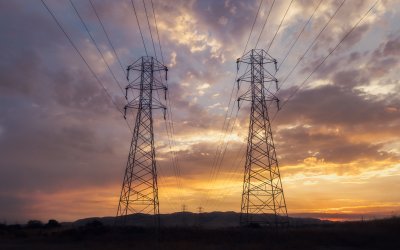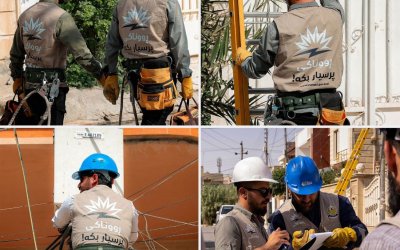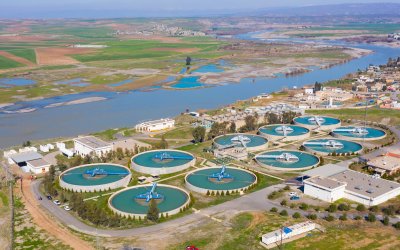Youth and civil society actors campaigning to enhance accountability in addressing Iraq’s water and environmental crises face various challenges, from lack of transparency and access to information, to inadequate legal protection and a complex government bureaucracy. The apportionment of government departments according to a quota system based on ethno-sectarian identities and political affiliations introduced following the 2003 US-led invasion of Iraq set the stage for a fragmented and weak governance system largely incapable of addressing the country’s complex infrastructural needs.[1] The government agencies responsible for environmental and water management are no exception.
War, poor governance, and the accelerated pace of climate change have had disastrous effects on Iraq’s environment over the past decade, exposing the country’s antiquated environmental infrastructure and its weak governance system.[2] Interagency coordination is impeded by the fractious relationships between the political factions controlling these departments. Short-term investments that are sought to bring more financial or political gains to the dominant political parties are often prioritized. Indeed, the demanding nature of investments in environmental infrastructure have pushed it further down the priorities list of consecutive governments. These dynamics have led to an accumulation of environmental problems that require exceptional levels of investments to prevent further degradation. Successive governments have increasingly recognized the country’s environmental issues, but their responses have lacked a comprehensive and long-term consideration of the use of water and land resources on the ecosystem.[3]
Propelled by the belief that bottom-up accountability mechanisms are needed to measure and monitor government outcomes, IRIS launched the “Youth for Accountability in Environmental Governance” (YAEG) program in 2024. Twenty young leaders from across Iraq convened in Sulaymaniyah on two separate occasions in order to engage with government officials and experts, discussing both challenges in environmental governance and pathways to enhanced accountability.[4] Drawing from these discussions, this policy brief explores the prospects for new approaches towards accountability in environmental governance. The discussions defined four main avenues for youth and civil society engagement to enhance accountability in environmental governance.
Accountability in environmental strategy
YAEG participants and government officials emphasized the importance of pursuing enhanced accountability in Iraq’s strategic planning processes. In recent years, the Iraqi government has not been successful in formulating environmental and water strategies that are aligned with financial and political realities. For example, the Strategy for Water and Land Resources in Iraq (SWLRI) that covered the period 2015-2035 was based on a large and fairly comprehensive database that encompassed different environmental sectors. Nonetheless, the investments it required were by far out of sync with what the government is capable or willing to commit, rendering the strategy ineffective.
For environmental governance to be inclusive of the needs of the current and future generations, youth and civil society actors must be included in the formulation of environmental strategies and treated as stakeholders with the right to hold government agencies accountable. The YAEG workshops highlighted that youth and civil society are capable of contributing to these discussions and should be given the space and opportunity to participate. Comprehensive long-term strategies need to be put in place to secure the sustainability of water and land resources – and youth must play an important role in devising them. These strategies require extensive and accurate datasets and projections of various environmental parameters to assess scenarios and determine investment needs.
The government has committed itself to international climate change initiatives, which in theory should play a major role in shaping Iraq’s environmental planning. The Nationally Determined Contributions (NDC) is a commitment that the Iraqi government has declared in 2015 to mitigate emissions and adapt to the effects of climate change. While unbinding, the two documents associated with this commitment, namely the finalized NDC and the Intended Nationally Determined Contributions (INDC), set measurable objectives, albeit to a limited extent, and reflect the government’s recognition of the significance of these objectives. Some of these objectives include expanding the capacity of water treatment facilities to 6.4 BCM/year, building more treatment units to recycle 2078 BCM/year of wastewater and allocating $80 billion to that end, and allocating over $45 billion for the transition to modern irrigation methods, all by 2035.[5]
Accountability in environmental data collection and access
Pursuing accountability on these environmental strategies and commitments is complicated by numerous challenges. The SWLRI represents a key resource in tracking where the country stands in terms of water resources and infrastructure investment, yet it was never published. Data associated with water resources are guarded as state secrets on the dubious grounds that making such information public could impact water negotiations with upstream countries Turkey and Iran. Reservoir levels, water flow rates, and crop production can already be estimated by other countries using geographic information system and remote sensing technologies. Lack of access to data – including not only water quantity/quality data but also information on progress towards the completion of key water infrastructures – prevents civil society from holding government departments accountable. Civil society activists who pursue this information without adequate legal protections often face intimidation.
The Right of Access to Information bill presented to the parliament in February 2024 specifically prohibits citizens from obtaining any information that “affects the negotiations with other countries.”[6] This does not only hinder accountability in strategic environmental planning, as water and agriculture could fall under this criterion, but could also be used to target civil society members who engage in tracking implementation and progress for evidence-based advocacy efforts. The Right of Access to Information bill should explicitly state the right of civil society in obtaining information related to environmental governance. An Iraqi environmental activist participating in the YAEG workshop stated: “Often, public anger emerges as a result of lack of data and information about pollution, the health impacts, and so on. The Right of Access to Information Law could ensure communication between the government and the public, enabling civil society to track progress on environmental governance.”
Youth and civil society actors can spearhead community efforts in data collection on water pollution and air quality for climate and environmental action. Access to data is essential for civil society’s efforts to press the government towards prioritizing the most essential infrastructures. Grand projects such as the Basra Seawater Treatment could in theory make a real difference to Basra’s water supply, but these highly ambitious projects should not distract from the government’s responsibility to build and maintain the more basic and fundamental components of water infrastructure – i.e., the water grid and treatment plants. Youth-led accountability efforts must be organized around what is most essential – as determined by the available data – rather than what is most ambitious.
Accountability in the performance of government agencies
Success in implementing environmental strategies requires a serious commitment from the government in providing sectoral agencies with the adequate resources to carry out their responsibilities while also establishing robust mechanisms for interagency coordination. YAEG participants recognized the financial and technical constraints that limit government departments and agencies in fulfilling their responsibilities in environmental governance. The Iraqi government has so far failed in providing adequate resources to relevant departments to achieve their goals outlined in SWLRI, NDC, and other strategic plans. For example, the Ministry of Environment’s budget peaked at 0.06% of the corresponding country’s total budget during the last decade while MoWR, Ministry of Agriculture (MoA), and the Ministry of Construction, Housing, Municipalities and Public Works averaged 0.46%, 0.67% and 1.60% respectively. As a result of inadequate financial resources, ministries lack the necessary equipment required to maintain facilities, and impeded them from expanding their operational capacities.
Further, the government is yet to set up robust mechanisms for interagency coordination for government departments to coordinate policy planning and implementation with one another. The government’s approach has traditionally been forming committees that include different governmental agencies with the leadership of the relevant ministries. While this approach has worked in some narrow contexts such as emergency drought response, it has proven suboptimal for coordination on environmental policymaking and long-term projects. A participant in the YAEG workshop noted: “There is a lack of communication between different ministries and an understanding of their roles. The lack of communication between the sectoral ministries has resulted in the absence of a central environmental monitoring body.”
Bottom-up accountability has the potential to play a major role in enhancing the performance of government agencies. Youth and civil society can initiate advocacy campaigns to keep budgetary allocations to sectoral ministries in tandem with environmental strategies. For instance, the INDC states that “Transition to modern irrigation] will cost $45.543 billion over the next twenty years.”[7] Iraq should have allocated approximately IQD 29.82 trillion during the last 10 years to be on track, yet the overall budget for the MoA by 2022 did not exceed IQD 4.27 trillion. Youth and civil society can press for the prioritization of the environmental agenda in the list of government priorities.
Accountability in ecosystem management
Environmental accountability requires a proactive sense of long-term ecological awareness. Investments in infrastructure projects, factories, and oil facilities should have to meet environmental impact assessment standards to ensure that the use of environmental resources does not leave chronic impacts on their environs and populace. This crucial component of environmental management is completely absent from the ethos of the current governance system.
The results of poor ecological management can be devastating. Water experts in the YAEG workshop discussed the draining and eventual disappearance of Sawa Lake. In this case, the local government of Muthana province ignored farmers and investors arbitrarily digging an enormous number of illegal wells for private farms and factories, drawing from the lake’s underground water table and completely draining the lake.[8] Exploiting the lake’s ecosystem was seen as “good business” by local government officials, farmers, and investors; however, locals are lamenting the loss of a natural landscape feature and an intrusion of invasive animals and insects. Had the ecosystem been given the appropriate consideration, the local government would have known that the short-term socioeconomic profit from these investments falls starkly short of the long-term repercussions.
In this context, bottom-up environmental accountability requires long-term ecological awareness among youth and civil society. Civil society has proven conscious of this concept in certain cases. Plans to build the Makhool Dam was stopped partly as a result of civil society campaigns with the help of academia. The dam was anticipated to endanger at least 184 archeological sites and displace thousands of families, a potentially disastrous investment with a staggering $3 billion price tag.[9] Iraqi youth can apply this practice to other developments and infrastructure projects by highlighting the long-term impact on the ecosystem and its associated consequences on livelihoods, health, and equality of vulnerable communities.
Conclusion
Iraq’s protracted environmental and water woes have particular implications for the younger generations. As in the rest of the world, Iraq’s youth increasingly realize that it is their future that is at stake, and are therefore leading the charge for climate action. They are exerting concerted efforts for climate justice through demanding action and concrete steps from policymakers while also striving to hold them accountable.
That being said, youth and civil society often lack the complete picture on how government departments and agencies in Iraq relate to one another in environment and climate governance, and more importantly, how lack of interagency coordination, mismanagement and corruption impede the performance of state institutions. Youth and civil society advocacy efforts are often reduced to raising community awareness, while leaving the crucial issues of accountability and governance to officials and specialists. While the government has expressed its willingness to work with youth and civil society and even included them as part of Iraq’s delegations in intergovernmental platforms such as COP28, it has yet to harness their full potential in collective environmental and climate action. To be sure, sustained efforts to empower and involve youth in environmental governance will be essential for building a more sustainable and resilient future in the face of environmental challenges.

 ,
, 






